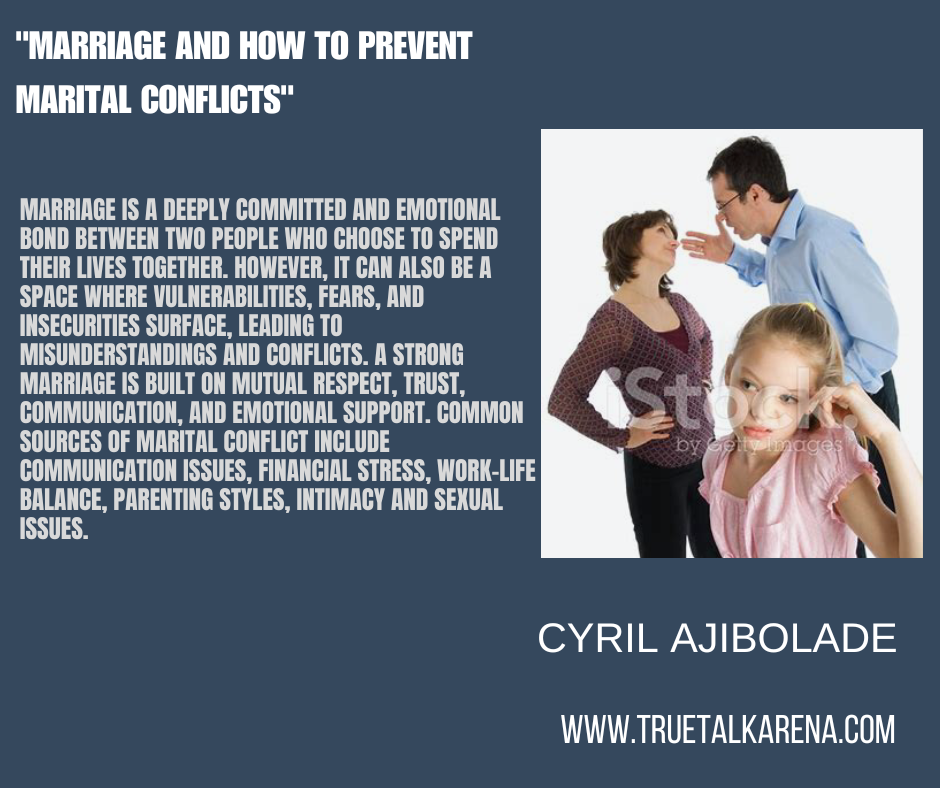
MARRIAGE AND HOW TO PREVENT MARITAL CONFLICTS
Marriage is a significant institution that has been a cornerstone of human society for centuries. It is more than just a legal contract; it is a deep, spiritual, and emotional bond between two people who choose to spend their lives together. However, like any close relationship, marriage comes with its own set of challenges.
Conflict in marriage is natural, but learning how to manage and prevent conflicts is essential to maintaining a healthy, long-lasting relationship.In this article, we will explore the dynamics of marriage, the common sources of marital conflict, and practical ways to prevent and manage these conflicts, ensuring a harmonious and loving partnership.
The Nature of Marriage:Marriage is a unique relationship because it involves a deep commitment and emotional investment from both parties. Unlike other relationships, marriage is usually entered into with the expectation of permanence. It involves navigating life’s challenges together, sharing personal growth, and developing emotional intimacy.However, because of the closeness of the relationship, marriage is often the space where both partners' vulnerabilities, fears, and insecurities surface. This can lead to misunderstandings and conflicts if not managed properly.At the core of a strong marriage is mutual respect, trust, communication, and emotional support. These pillars form the foundation on which the marriage can withstand external pressures and internal struggles.
Common Sources of Marital conflicts:
Conflicts in marriage can arise from various sources. Understanding these sources can help couples address issues before they escalate into bigger problems. Some of the most common causes include:
Communication Issues:
Communication is the bedrock of any relationship, but it can also be the source of major conflicts if not handled correctly. Misunderstandings, misinterpretations, or lack of clear communication can create resentment and frustration. In many cases, partners may assume that their spouse should know how they feel or what they want, leading to unmet expectations.
Financial Stress:
Money is one of the leading causes of marital conflict. Differences in spending habits, debt, budgeting priorities, and financial goals can create tension. When one partner feels that the other is irresponsible with money or not contributing equally, it can lead to resentment and feelings of unfairness.
Work-Life Balance:
With the pressures of modern life, many couples struggle to balance work and personal life. Overworking or not dedicating enough time to the relationship can cause emotional distance. When one partner feels neglected or that their spouse is too focused on work, it can lead to feelings of being undervalued.
Parenting Styles:
Raising children can bring immense joy, but it also introduces new challenges. Differences in parenting styles, discipline methods, and involvement in the child’s life can cause conflicts. One partner may feel the other is too strict or too lenient, or that their approach to parenting is not respected.
Intimacy and Sexual Issues
Intimacy is crucial for maintaining a healthy emotional and physical connection between partners. Problems can arise when one partner feels a lack of emotional or physical closeness. Sexual compatibility or mismatched desires can lead to frustration, rejection, and feelings of inadequacy if not addressed openly.
Extended Family and In-Laws:
Managing relationships with in-laws or extended family can be tricky. Differing expectations about the involvement of family members in the couple’s life, or conflicts with in-laws, can lead to tension. It's important for couples to establish boundaries while maintaining respect for their families.
Unmet Expectations:
Many conflicts stem from unspoken or unrealistic expectations. Each partner enters marriage with a set of beliefs about how the relationship should work, often shaped by upbringing, culture, or previous experiences. When these expectations are not met, frustration and disappointment can follow.
Strategies to Prevent Marital Conflicts:
While conflict is inevitable in any close relationship, there are effective ways to prevent issues from escalating. Here are some strategies couples can use to minimize conflicts and build a stronger marriage:
Prioritize Open and Honest Communication:
Open communication is key to preventing misunderstandings. Both partners should feel comfortable expressing their thoughts, feelings, and concerns without fear of judgment. This means actively listening to each other and addressing issues as they arise rather than letting resentment build up. Make a habit of checking in with each other regularly to discuss feelings and expectations.
Practice Active Listening:
Active listening involves paying full attention to your partner without interrupting, judging, or planning your response. It’s about understanding their perspective and validating their emotions. By truly hearing your partner, you demonstrate empathy and respect, which can help prevent minor disagreements from turning into major conflicts.
Set Clear Financial Goals and Budgets:
To avoid financial stress, couples should be transparent about their financial situations and agree on financial goals. Create a joint budget that reflects both partners’ priorities and establish guidelines for spending and saving. Regularly discuss finances to avoid surprises, and support each other in financial decisions.
Maintain a Healthy Work-Life Balance:
Couples should strive to create a balance between work and personal life. Set aside dedicated time for each other, whether it’s weekly date nights, weekend getaways, or simply spending quality time together at home. Making your relationship a priority can help prevent feelings of neglect and keep emotional intimacy strong.
Discuss Parenting Approaches:
Before having children, or when differences arise, couples should discuss their views on parenting. Establish a united front by agreeing on core values and approaches to discipline. Respect each other’s opinions and be willing to compromise for the benefit of the child and the relationship.
Foster Emotional and Physical Intimacy
Intimacy is more than just physical connection; it’s about emotional closeness, trust, and vulnerability. Make time for romance and affection in your relationship. Don’t shy away from discussing sexual needs and desires. Open communication in this area can help prevent feelings of rejection or dissatisfaction.
Set Boundaries with Extended Family:
While maintaining healthy relationships with extended family is important, it’s crucial to establish boundaries that protect the privacy and integrity of your marriage. Be clear about your expectations for family involvement and make sure both partners feel supported in these boundaries.
Manage Expectations Realistically:
No relationship is perfect, and expecting your partner to fulfill every need is unrealistic. Accept that there will be differences, and approach them with an attitude of compromise and understanding. Adjusting expectations can prevent disappointment and foster a more forgiving attitude when conflicts arise.
Seek Professional Help When Necessary:
Sometimes, conflicts in marriage require outside help. Seeking couples therapy or counseling can provide an objective perspective and help both partners develop tools for resolving issues. Therapy can be particularly helpful when conflicts seem to recur or when communication breaks down.
In Conclusion,Marriage is a journey that requires effort, patience, and dedication from both partners. While conflicts are a natural part of any relationship, learning how to navigate and prevent them is essential to maintaining a healthy, loving marriage. Open communication, mutual respect, and a willingness to compromise are key elements in preventing conflicts from escalating.By recognizing common sources of conflict and adopting proactive strategies, couples can strengthen their bond and ensure their marriage is a source of joy, support, and fulfillment.



0 COMMENTS